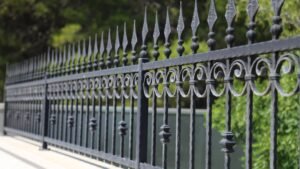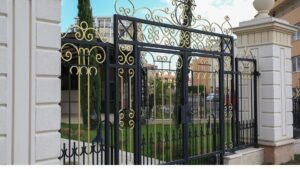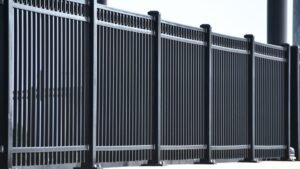Welcome to our comprehensive guide on answering a common question for homeowners: “Are wooden or metal gates cheaper?” Whether you’re upgrading your home’s security, enhancing curb appeal, or simply exploring gate options on a budget, it’s important to know that the cost of a gate goes beyond its initial price. In this article, we’ll dive into the upfront expenses of wooden and metal gates, but also look at long-term factors like maintenance, durability, and overall value. By the end, you’ll have a clear understanding of which option is truly more cost-effective for your needs. Let’s get started!
Wooden gates are generally cheaper than metal gates when it comes to upfront costs, with wood being a more affordable material. However, metal gates tend to be more durable and require less maintenance over time, potentially making them a more cost-effective choice in the long run depending on the environment and upkeep.
Table of Contents
Initial Cost Comparison
When considering a gate for your home or property, understanding the upfront costs is crucial. This section breaks down the costs associated with wooden and metal gates, giving you a clear comparison to help make an informed decision.
Upfront Costs for Wooden Gates
Wooden gates are a popular choice for their natural aesthetics and versatility. However, the initial costs can vary significantly based on several factors.
- Average price range: The price for a standard wooden gate typically falls between $200 and $1,200, depending on the type of wood. Softwoods, such as pine, are more affordable, with prices generally ranging from $200 to $600. On the other hand, hardwoods like oak or cedar are more expensive, often priced between $500 and $1,200. These higher-quality woods offer greater durability and weather resistance but come at a steeper price.
- Customization impact: The complexity of your gate’s design has a direct impact on cost. A simple, flat-panel wooden gate will naturally be more affordable compared to a custom-built gate with intricate carvings, unique shapes, or decorative elements. Larger gates, such as those used for driveways, can also significantly increase the overall price due to the added materials and labor required.
- Cost-effective options: For those on a budget, pressure-treated wood or softwoods like pine offer a great balance between affordability and durability. Pressure-treated wood undergoes a process that makes it more resistant to rot and pests, ensuring a longer lifespan at a lower initial cost. While these options may not have the same longevity as hardwoods, they provide a practical solution for homeowners looking to minimize upfront expenses.
Upfront Costs for Metal Gates
Metal gates are renowned for their strength and durability, but like wood, the price can vary based on materials and design features.
- Average price range: Basic metal gates typically start at around $300 and can go up to $3,000 or more, depending on the material. Wrought iron gates are on the higher end, with prices often starting at $800 and reaching upwards of $3,000 for custom designs. Steel gates offer a mid-range option, priced between $500 and $2,500, while aluminum gates tend to be the most affordable, with costs ranging from $300 to $1,500.
- Material differences: The cost of metal gates is heavily influenced by the type of metal used. Wrought iron is the most expensive due to its strength, aesthetic appeal, and the labor-intensive process involved in its production. Steel gates provide a more cost-effective solution while maintaining durability, although they can be prone to rust if not properly treated. Aluminum gates, being lightweight and rust-resistant, are often the cheapest metal option, though they may not have the same level of security or sturdiness as wrought iron or steel.
- Customization and design elements: Adding custom elements to a metal gate—such as intricate designs, powder coating for additional protection, or decorative finishes—can significantly increase the price. These customizations not only add to the visual appeal but also enhance the gate’s durability and longevity, which is why many homeowners are willing to invest more in a personalized metal gate.
Which is Cheaper Initially?
When it comes to initial cost, wooden gates are generally cheaper than metal gates. A basic wooden gate, particularly if made from softwood or pressure-treated wood, can be a cost-effective solution, with prices typically lower than those of metal gates made from wrought iron or steel. However, while wood may be cheaper upfront, metal gates often provide greater value in the long run due to their superior durability and lower maintenance needs. Aluminum gates can be a more affordable metal option, but even they tend to have a higher starting price compared to softwood gates.
In conclusion, if your primary concern is minimizing the initial investment, wooden gates, particularly those made from pine or pressure-treated wood, are likely the cheaper option. However, for those willing to spend a bit more upfront, metal gates can offer enhanced durability and reduced maintenance costs over time, potentially saving you money in the long term.

Long-Term Cost Considerations
When it comes to selecting the right gate material, homeowners should look beyond the initial installation costs. Over time, the long-term costs of maintaining and repairing wooden and metal gates can significantly impact the overall investment. This section will delve into these considerations, helping you make an informed choice.
For accurate maintenance estimates, it’s a good idea to consult a professional gate installer in your area.
Maintenance Costs for Wooden Gates
Regular Maintenance Needs
Wooden gates, while aesthetically pleasing and traditional, demand consistent upkeep to retain their charm and structural integrity. Wood is a natural material that’s prone to the elements, making it essential to regularly paint, stain, and seal the wood to protect it from moisture and weather-related damage. Without these protective layers, wooden gates can quickly become susceptible to rot, mildew, and warping, especially in areas with high humidity or heavy rainfall. Routine sealing and staining not only keep the gate looking fresh but also extend its lifespan, ensuring that it remains functional and attractive.
Cost of Repairs
Despite regular maintenance, wood is still vulnerable to a range of issues, such as warping or cracking due to exposure to the sun, moisture, or fluctuating temperatures. Over time, wooden gates may develop rotten sections or suffer damage from pests like termites. Repairing such damage can involve replacing sections of the gate, treating pest infestations, or even re-aligning warped areas to maintain the gate’s functionality. The costs for these repairs can vary, depending on the severity of the damage, but it’s not uncommon for homeowners to face unexpected bills due to natural wear and tear.
Maintenance Frequency and Costs
Wooden gates typically require annual staining or sealing, with costs ranging from $150 to $500 per session, depending on the size of the gate and the materials used. In addition, bi-annual inspections are recommended to catch early signs of rot, pests, or structural damage, with potential repair costs reaching $200 to $700 or more if significant repairs are needed. Over a 10-15 year period, these costs can accumulate significantly, making the overall investment in wooden gates higher than initially anticipated.
Maintenance Costs for Metal Gates
Durability Advantage
Compared to wooden gates, metal gates are often praised for their durability and low maintenance needs. Metals like steel, aluminum, and wrought iron are highly resistant to weather conditions and wear, requiring far less frequent upkeep. Metal gates are less prone to the common issues that plague wooden gates, such as warping, cracking, or rot. This durability makes them an appealing choice for homeowners looking for a long-term, hassle-free solution.
Potential Repairs
While metal gates are generally more durable, they are not entirely maintenance-free. Depending on the type of metal, gates can be vulnerable to rust (especially with wrought iron) or corrosion (in steel). However, these risks can be mitigated with proper protective coatings such as powder coating or galvanization, which act as a barrier against moisture and the elements. If rust or corrosion does develop, repairs might involve sanding down the affected area and applying protective coatings, but these incidents are typically less frequent than with wood.
Maintenance Frequency and Costs
On average, metal gates require significantly less frequent maintenance compared to wooden gates. Depending on the climate, rust-proofing or repainting might only be necessary every 5-10 years, with costs ranging from $300 to $800, depending on the size and complexity of the gate. Some high-quality metal gates with excellent protective coatings may even require less maintenance, making them a cost-effective option over the long term. Compared to the annual demands of wooden gates, metal gates offer lower lifetime maintenance costs, which can save homeowners thousands of dollars over time.
Cost of Replacing or Repairing Gates Over Time
When evaluating long-term costs, it’s essential to consider the likelihood of needing to replace or make major repairs to your gate. Wooden gates, due to their vulnerability to environmental factors, may need to be replaced or undergo significant repairs after 10-15 years, especially in harsh climates. Major repairs, such as replacing large sections of wood, can cost upwards of $1,000 or more depending on the extent of the damage. Complete gate replacements can cost even more, depending on the size and material used.
In contrast, metal gates, particularly those made of durable materials like aluminum or galvanized steel, can last 20-30 years or longer with minimal maintenance. While rust or corrosion may eventually require attention, the overall costs of maintaining a metal gate tend to be lower than for wood. Major repairs for metal gates are less common, and full replacements may not be necessary until several decades have passed.
Ultimately, while the initial investment in a wooden gate may be less expensive upfront, the ongoing maintenance and potential need for frequent repairs or replacements can drive up long-term costs. Metal gates, though often more costly at installation, generally offer better value over time due to their longevity and lower maintenance requirements.
By considering these long-term cost implications, homeowners can make a more informed decision about which gate material best suits their needs and budget.
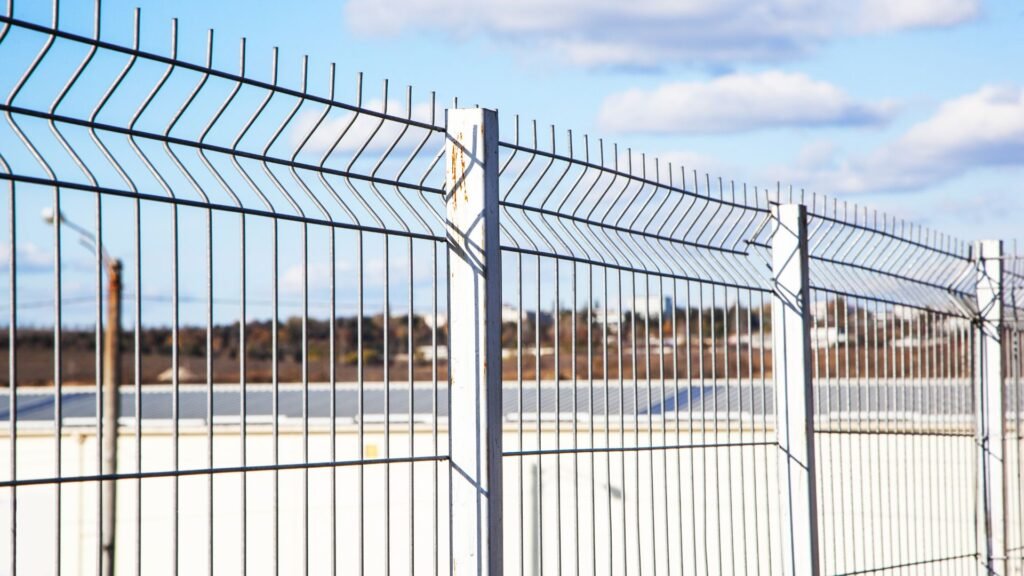
Durability And Longevity
When investing in a gate for your property, durability and longevity are critical factors to consider. Wooden and metal gates each have their unique attributes, and understanding their lifespan based on materials, environmental exposure, and maintenance requirements can help you make an informed decision. Below, we explore the durability of both wooden and metal gates in detail.
Lifespan of Wooden Gates
How long do wooden gates last?
The lifespan of a wooden gate can vary significantly depending on several factors, including the type of wood, climate, and maintenance routines. Typically, well-maintained wooden gates can last anywhere between 10 to 20 years or longer. Hardwoods such as oak, cedar, and teak tend to last longer due to their natural resistance to rot and pests, while softwoods like pine and spruce may require more frequent maintenance to maintain longevity.
Impact of environment
Climate plays a crucial role in determining the longevity of wooden gates. In areas with high humidity or frequent rainfall, wooden gates are more prone to swelling, warping, and rot. For example, a wooden gate in a tropical or coastal area may degrade faster compared to one installed in a dry, arid climate. Coastal environments, in particular, expose wooden gates to higher levels of moisture and salt, which can accelerate the degradation process unless proper treatments like sealing and staining are applied regularly.
Conversely, wooden gates in dry climates tend to last longer, though extreme heat can cause wood to crack or dry out if not properly treated. Regular maintenance, including repainting, sealing, and treating the wood against pests and rot, can help extend the life of wooden gates, regardless of the climate.
Lifespan of Metal Gates
How long do metal gates last?
Metal gates, especially when made from durable materials like wrought iron, steel, or aluminum, generally have a longer lifespan compared to wooden gates. With proper care and protective treatments, metal gates can last upwards of 20 to 50 years or more. The key to ensuring the longevity of metal gates lies in protecting them from rust and corrosion, which can be achieved through coatings, galvanization, or powder finishes.
Environmental impact
Different environments have a distinct impact on metal gates. For instance, in humid or rainy climates, unprotected iron gates can quickly rust, shortening their lifespan. Steel gates may also be susceptible to rust if they are not galvanized or coated with a rust-resistant finish. However, aluminum gates, being naturally resistant to corrosion, are ideal for areas with high humidity or salty air, such as coastal regions. They are lightweight, highly durable, and require minimal maintenance compared to iron or steel alternatives.
In contrast, metal gates installed in drier, less humid climates tend to have a much longer lifespan, particularly if they are regularly maintained. Repainting or recoating metal gates every few years can prevent rust and keep them in good condition for decades.
Comparison of metal types
When comparing the durability and cost-effectiveness of different metals used for gates, wrought iron, aluminum, and steel are the most common options. Wrought iron is known for its strength and traditional appeal, but it requires regular maintenance to prevent rust. Steel, particularly galvanized or stainless steel, offers excellent durability and resistance to damage, making it a popular choice for long-lasting gates. Aluminum, while not as strong as steel or iron, is lightweight, resistant to corrosion, and generally requires the least amount of maintenance, making it a highly durable and cost-effective option, especially for homeowners in coastal areas.
In summary, the longevity of both wooden and metal gates largely depends on the materials used, the surrounding environmental conditions, and the level of maintenance. By understanding these factors, you can choose the best gate material to suit your needs and ensure it stands the test of time.

Aesthetic And Practical Considerations
When it comes to choosing the right gate for your property, there are several key factors to consider, including both aesthetics and functionality. Your gate not only serves as a security feature but also as a prominent design element for your home or business. In this section, we’ll delve into the aesthetic preferences and practical functionality of two popular gate materials: wood and metal.
Aesthetic Preferences
Wooden Gates
Wooden gates have long been a favorite for those who appreciate traditional or rustic charm. They offer a timeless, natural look that can be customized in various ways. Whether you’re aiming for a country cottage vibe or a stately, classic entrance, wood has the versatility to meet your needs.
You can stain or paint wooden gates to blend seamlessly with the surroundings, making them an excellent choice for homeowners who want a personalized look. This is particularly beneficial in neighborhoods with older, more established homes or in rural settings where nature-inspired aesthetics are appreciated. The grain, texture, and warmth of wood can create a welcoming, organic feel, making it a popular option for those who prioritize curb appeal.
Metal Gates
On the other hand, metal gates are ideal for those who seek a sleek, modern appearance. Their versatility in design allows for a wide range of styles, from intricate and ornate to minimalist and contemporary. Whether you prefer a classic wrought iron gate with intricate details or a more streamlined aluminum gate with clean lines, metal offers endless design possibilities.
Metal gates are often associated with sophistication and elegance, making them the perfect complement to modern homes or commercial properties looking to make a strong visual statement. Additionally, because of their customizable nature, they can easily blend with various architectural styles, offering a polished and durable aesthetic appeal that remains impressive over time.
Functionality and Security
Wooden Gates
While wooden gates may provide adequate security, they are often chosen more for their privacy than for their strength. A solid wooden gate can block the view of passersby, making it an appealing option for those who value discretion in their outdoor spaces. However, wood is not as inherently strong as metal and may require more maintenance to keep it in top condition.
Over time, wooden gates can succumb to environmental elements like moisture and pests, potentially weakening their structure. While they are certainly a viable option for many residential properties, they may not be the best choice for high-security needs. However, for those who value privacy and prefer a softer, more natural look, wooden gates remain a strong contender.
Metal Gates
In contrast, metal gates provide superior security, making them the preferred option for properties where protection is a top priority. Whether it’s an industrial site requiring high-level security or a high-end home with valuable assets, metal gates are unmatched in their strength and durability. They are less prone to wear and tear from environmental factors and can resist tampering far better than wooden gates.
The robustness of materials like steel and wrought iron makes metal gates highly resistant to break-ins, ensuring that your property remains safe and secure. Additionally, metal gates often incorporate advanced locking mechanisms and automation options, further enhancing their functionality as a security measure. If you’re looking for a gate that balances both aesthetic appeal and maximum security, metal gates are an excellent choice.
In conclusion, whether you’re leaning toward the classic charm of wooden gates or the modern elegance and strength of metal gates, your decision should reflect both your aesthetic preferences and the level of functionality you need. While wood offers a warm, natural look and solid privacy, metal gates provide unbeatable security and a long-lasting, versatile design. Choose the gate material that aligns with your lifestyle, property requirements, and personal style.

Environmental Impact and Sustainability
When choosing between wooden and metal gates, sustainability plays a crucial role in the decision-making process. Each material has unique environmental impacts, and understanding these can help you make an eco-conscious choice. Below is a breakdown of how wooden and metal gates stack up in terms of their environmental footprint.
Sustainability of Wooden Gates
Wooden gates are often seen as a natural and eco-friendly option, but there are important factors to consider regarding their sustainability.
- Renewable Resource: One of the primary benefits of wood is that it is a renewable resource. When sourced from sustainable forestry practices, wood is an excellent choice for environmentally-conscious consumers. Sustainable forestry ensures that trees are replanted after they are harvested, maintaining the forest ecosystem and providing a continuous supply of wood without causing deforestation. This can help reduce carbon emissions and promote biodiversity. Choosing certified wood from organizations like the Forest Stewardship Council (FSC) ensures that your wooden gate is sourced responsibly.
- Environmental Downsides: While wood is renewable, it is important to address the environmental concerns associated with the chemicals used to treat wooden gates. Many wooden gates require treatments like preservatives, stains, or paints to protect them from weather, pests, and rot. These chemicals can sometimes be harmful to the environment, releasing volatile organic compounds (VOCs) into the air and contributing to pollution. Additionally, if the wood is not sourced from sustainable forestry, deforestation can become a significant issue, leading to habitat destruction and increased carbon emissions. Therefore, while wooden gates can be eco-friendly, it is essential to carefully consider the sourcing and treatment of the wood.
Sustainability of Metal Gates
Metal gates, particularly those made from aluminum and steel, offer their own set of sustainability advantages and challenges.
- Recyclability: One of the biggest environmental benefits of metal gates is their recyclability. Metals like steel and aluminum can be recycled multiple times without losing their quality, making metal gates a sustainable option for long-term use. In fact, a large percentage of the steel and aluminum used today comes from recycled materials, which helps conserve natural resources and reduces the need for mining. This makes metal gates an eco-friendly choice, especially if you prioritize products made from recycled content. By choosing recyclable materials, you can reduce waste and contribute to a circular economy.
- Energy Consumption in Production: Despite the recyclability of metals, it is important to note that the initial production process for metals like aluminum and steel is energy-intensive. Mining, smelting, and refining metals require significant amounts of energy, which typically comes from non-renewable sources. This process can generate substantial greenhouse gas emissions, making the environmental impact of metal gate production higher compared to wood. However, the durability and longevity of metal gates can offset some of these environmental costs over time, as they tend to last longer than wooden gates and require less frequent replacement.
When it comes to sustainability, both wooden and metal gates have their pros and cons. Wooden gates, especially when sourced from sustainable forestry, offer a renewable resource option but may come with environmental drawbacks from chemical treatments. Metal gates, on the other hand, are highly recyclable, reducing waste, but their production process is energy-intensive. By weighing these factors and considering the specific environmental impacts, you can make a more informed, eco-friendly decision for your property.
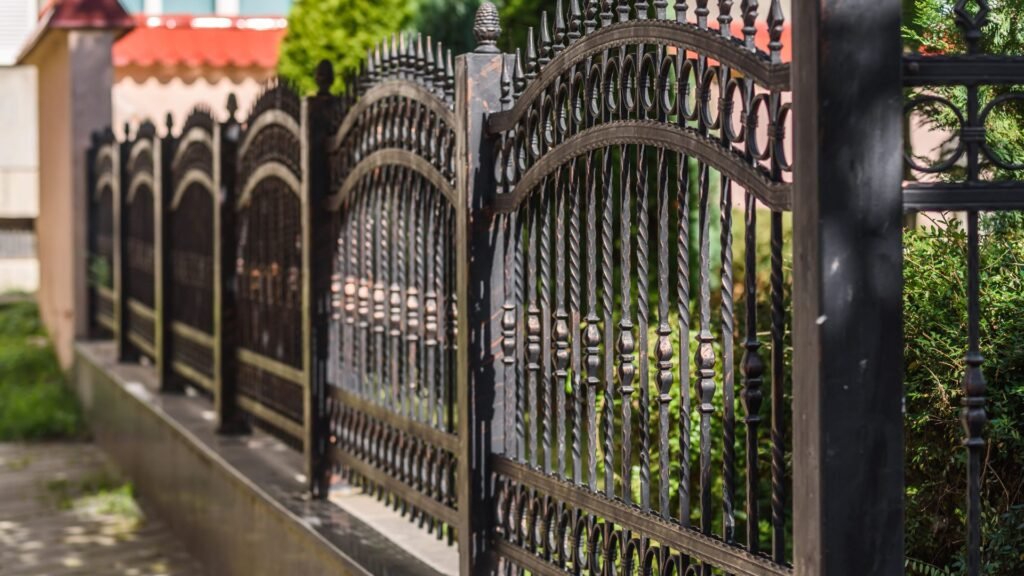
FAQs: About Are Wooden Or Metal Gates Cheaper
Are wooden gates cheaper than metal gates?
Yes, wooden gates are generally cheaper upfront compared to metal gates. The cost of wood is typically lower than metal, especially if you opt for softwoods like pine. However, metal gates may offer better long-term value due to their durability and lower maintenance requirements.
What are the long-term maintenance costs for wooden gates?
Wooden gates require regular maintenance to prevent rotting, warping, and damage from the elements. This includes painting, staining, and sealing, typically every 1-2 years. Repairs for damaged or weathered wood can also add to the costs over time.
Do metal gates require less maintenance than wooden gates?
Yes, metal gates generally require less frequent maintenance than wooden gates. However, they are still susceptible to issues like rust and corrosion, especially in wrought iron gates. Protective coatings like powder coating or regular paint touch-ups can help extend their lifespan and reduce maintenance needs.
Which type of gate lasts longer, wood or metal?
Metal gates usually have a longer lifespan compared to wooden gates. While wooden gates can last 10-15 years with proper care, metal gates—especially those made from steel or aluminum—can last several decades with minimal upkeep.
What type of gate is best for security, wood or metal?
Metal gates, particularly those made from steel or wrought iron, are generally better for security due to their strength and durability. Wooden gates can offer privacy and a certain level of security, but they are not as resistant to forced entry as metal gates.
Can wooden gates be as durable as metal gates if maintained properly?
While regular maintenance can extend the life of wooden gates, they are still more prone to environmental damage such as rot, warping, and pests like termites. Metal gates, particularly aluminum or steel, are inherently more durable and weather-resistant.
How do environmental factors affect wooden and metal gates?
Wooden gates are more vulnerable to moisture, extreme weather conditions, and pests, which can shorten their lifespan if not properly maintained. Metal gates, while more resistant to weather, can still suffer from rust in humid or coastal areas unless treated with protective coatings.
Which gate type is more environmentally friendly, wood or metal?
Wooden gates made from sustainably sourced wood can be more environmentally friendly due to wood’s renewable nature. However, they require treatments that may involve chemicals. Metal gates, on the other hand, are highly recyclable, though their production can be more energy-intensive.
Are custom designs more expensive for wood or metal gates?
Custom designs can increase the cost for both wood and metal gates. Intricate designs, carvings, and special finishes on wooden gates can raise prices, while detailed ornamental work on wrought iron or steel gates can also drive up costs. Generally, metal designs tend to be pricier due to the materials and labor involved.
Which gate type offers better value for money over time?
While wooden gates may be cheaper initially, metal gates often provide better long-term value due to their durability and lower maintenance costs. Homeowners looking for a longer-lasting solution with fewer ongoing expenses may find metal gates a more cost-effective investment over time.
Conclusion
In conclusion, when deciding between wooden and metal gates, it’s important to weigh the initial costs against the long-term value. While wooden gates are generally more affordable upfront, metal gates can offer greater value over time due to their durability, reduced maintenance needs, and resilience in varying environmental conditions. Ultimately, the best choice depends on your specific needs, including your budget, aesthetic preferences, location, and long-term plans. If you’re looking for a budget-friendly option and are willing to manage some maintenance, wood might be the right choice. However, if you’re aiming for longevity and low upkeep, investing in a metal gate could provide better savings in the long run.
About the Author:
Mike Veail is a recognized digital marketing expert with over 6 years of experience in helping tradespeople and small businesses thrive online. A former quantity surveyor, Mike combines deep industry knowledge with hands-on expertise in SEO and Google Ads. His marketing strategies are tailored to the specific needs of the trades sector, helping businesses increase visibility and generate more leads through proven, ethical methods.
Mike has successfully partnered with numerous companies, establishing a track record of delivering measurable results. His work has been featured across various platforms that showcase his expertise in lead generation and online marketing for the trades sector.
Learn more about Mike's experience and services at https://theleadguy.online or follow him on social media:



